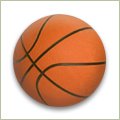
I was just reading an article about the misconceptions that high school athletes have about protein supplement use.
The article, scheduled to be published next month in the Journal of Strength and Conditioning Research, asked high school football players about the importance of using protein supplements when training to improve athletic ability.
As they predicted these athletes had many inaccurate beliefs about using protein supplements, including:
"Protein supplements are necessary to gain weight through weight lifting" - FALSE - you can gain muscle mass while weight training from protein in a food or a supplement.
"Protein supplements are better than a high-protein food for gaining weight through weight training" - FALSE - There's no advantage of protein found in supplements over protein found in food.
"Protein supplements are a good source of energy during a workout" - FALSE - Carbohydrates (mostly) and fat (in some cases) are what keeps you going during a workout or game. Protein is a muscle building block, not a fuel.
"Taking protein supplements will stop me from gaining unwanted fat on my body" - FALSE - If you take in too many calories (either as carbohydrate, fat, or protein) you will store those extra calories as fat.
So how best to get the protein you need?
According to the authors of this article, strength athletes need between 1.6 and 1.7 grams of protein for every kilogram (2.2 pounds) of body weight. Most adolescent boys eat this much in an average day. If you want to take a protein shake after a workout, that's OK, but you're paying $$ for the convenience.
Are there any dangers in taking too much protein?
The jury is still out, but some of the potential bad effects of too much protein include:
- excess fat gain
- dehydration
- gout
- kidney damage
- diarrhea
- bloating
- colon cancer
What should I eat?
Try to use high-protein, low-fat foods like:
- cheese made with skim milk
- skim milk
- low-fat yogurt
- chicken
- turkey
- fish
Who should I talk to if I want more information?
I'd go with an expert like a registered dietician who has special training in sports nutrition. Don't know where to find one? Look here.










